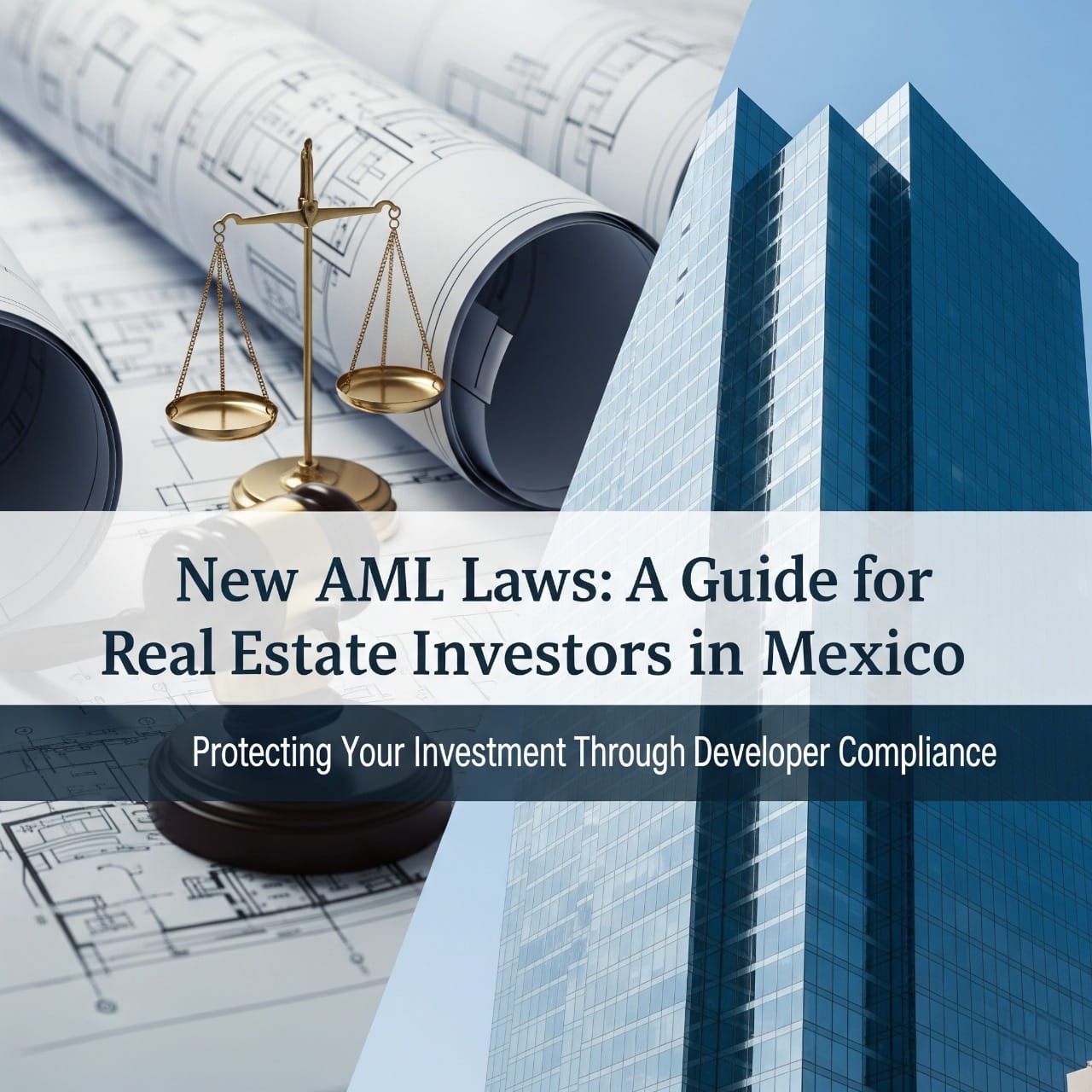New AML Compliance for Real Estate Developers in Mexico: Why It’s Your Best Protection
A major 2025 legal reform impacts developers directly. Understanding the new AML compliance for real estate developers in Mexico is your best tool for a safe investment.
Mexico’s real estate landscape has changed. In June 2025, a significant reform to the Anti-Money Laundering (AML) law was approved. This new legislation is not just a minor update. Instead, it is a complete overhaul of how authorities monitor real estate transactions. While the law brings new rules for many, it places a heavy focus on one key player: the real estate developer. For you, the foreign buyer, this is excellent news.
Previously, some rules for developers were ambiguous. However, the 2025 reform eliminates any gray areas. Real estate developers are now officially designated as a “vulnerable activity”. This means they are fully subject to all the demanding obligations of the AML law. Understanding these new duties is not just for lawyers. It gives you, the investor, a powerful checklist to measure the professionalism and legitimacy of any developer you work with. A developer’s compliance with the law is a direct reflection of the safety of your investment.
A New Era of Responsibility for Developers
The most important change is that developers are now fully responsible for implementing a complete AML and Counter-Terrorism Financing (AML/CFT) program. This is no longer a task they can delegate entirely or ignore. Furthermore, this obligation is not just for the final sale. Their legal duties begin the moment they receive funds for a project, including initial pre-sale payments or capital from early investors.
This new legal standard requires them to have a continuous and robust compliance system. Think of it as a mandatory operating license for their business. A developer who fails to comply with these rules is not just cutting corners; they are breaking federal law and risking severe penalties. This has direct implications for you. For instance, a non-compliant developer could face fines or legal actions that might halt or bankrupt the project you invested in. Consequently, their legal risk becomes your financial risk.
In addition, their compliance program must be documented. They need an official compliance manual, a formal risk-based approach, and an appointed compliance officer. They are now held to a standard of supervision that was once reserved almost exclusively for banks and financial institutions. This is a fundamental shift that separates professional, stable developers from high-risk operations.
Red Flags: How to Spot a Non-Compliant Developer
Because of this reform, you now have a clear benchmark for what to expect from a professional developer. A developer who is not meeting these legal standards should be a major warning sign. Your investment could be at risk if the developer you choose ignores their new responsibilities.
Here are the key red flags to watch for:
- They Don’t Ask Detailed Questions: A compliant developer is legally required to identify every client and understand their economic activity. As a result, they must ask you for detailed information and official documents. If a developer seems casual about your identity or the source of your funds, this is a serious problem. It means they are not following the law.
- They Have No Compliance Officer: The law requires developers to have a designated person responsible for their AML program. Ask them who their compliance officer is. A legitimate developer will have a clear answer. However, if they seem confused by the question, it suggests they do not have the required structure in place.
- They Downplay Legal Formalities: A professional developer understands the new regulations are serious. They will be prepared to explain their compliance process to you. Conversely, a developer who dismisses these rules as “unnecessary paperwork” or “just a formality” is demonstrating a disregard for the law that could affect other areas of their business, such as permits and construction quality.
Knowing these points gives you power. A developer’s adherence to AML compliance for real estate developers in Mexico is a strong indicator of their overall professionalism and stability.
Your Questions Are Your Shield
As an informed buyer, you have the right to ask questions that confirm your developer is operating legally. A transparent and compliant developer will welcome these questions as an opportunity to demonstrate their professionalism. In contrast, a risky developer may become evasive or defensive.
Here are a few strategic questions to ask:
- “Could you explain your process for client identification to comply with the 2025 AML reform?”
- “Who is your designated compliance officer responsible for your AML program?”
- “How has your company adapted its procedures to meet the new requirements for real estate developers under the AML law?”
Their answers will tell you a lot. A confident, clear response suggests a business that is well-prepared and takes its legal duties seriously. This is the type of partner you want. A vague or dismissive answer, on the other hand, tells you to be cautious. Ultimately, choosing a developer who respects the law is one of the most important steps you can take in protecting your property and your financial future in the Riviera Maya.
Facing a dispute with a developer or concerned about AML compliance for real estate developers in Mexico? Don’t navigate it alone. Contact PeninsuLawyers to protect your investment and secure your property rights.



